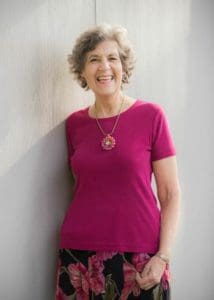You Learn More When You Are Laughing. Member Spotlight: Judy Gordon
Judy Gordon has been in the field of mediation since 1987, something she found while she was dancing around her living room by herself during an exceedingly difficult time in her life. She said she was struck by a thought suddenly: ‘Since you’re having so many problems in your life, you should go help someone.’ The very next day she saw an advertisement for The Volunteer Center of Alameda County in Oakland. She brought in her resume, and began a training for a local mediation organization, the Conciliation Forums of Oakland (Now SEEDS), that very week, and her ‘whole life changed’.
FEMA and the Post Office
 In her career spanning over 30 years in the field of mediation, Judy has worked and trained in many capacities. In her current work, she is both a reservist for FEMA (Federal Emergency Management Agency) and a mediator for the US Post Office REDRESS Program.
In her career spanning over 30 years in the field of mediation, Judy has worked and trained in many capacities. In her current work, she is both a reservist for FEMA (Federal Emergency Management Agency) and a mediator for the US Post Office REDRESS Program.
Judy began her work with FEMA after Hurricane Katrina and has been present in the aftermath of over 30 disasters on US soil since then. Because it is a paramilitary organization, Judy notes the interesting aspect of “mediating in a military culture; the shift in language, the role of the command structure, the influence of military thinking around internal conflicts that arise, the striking differences between different situations and the people with whom I work”. A mediator, or sometimes several for large disasters, is tasked to work to support the operations. At FEMA, mediators work mainly with employees, any employees in the building, rather than with survivors. This system serves to help resolve any conflicts that may cut into the time of those working in disaster response.
Working on the Ground
Each assignment puts her on the ground for about two months, and she says that despite any difficulties, “it is exciting work that allows her to meet all sorts of people. The mediators usually conduct a lot of trainings, as actual mediations come with a stigma surrounding them. This originates in the difficulties faced by many in the mediation field – namely, that it is a challenge for people to unlearn the idea that a conflict must be at its peak in order to be addressed.”
In her role at local Post Office locations, Judy works within a mediator role that functions to facilitate communication between employees and their supervisors. Although this is a vastly different body to FEMA, the majority of her work is being done within these huge bureaucratic systems, which involves nuances and challenges that are often different from individual or community mediation.
Philosophy of mediation
Judy is a strong believer that the way one mediates, being a mediator in all senses of the word, is directly connected to who you are as a person. Without understanding that each person involved lives in their own reality, it is difficult to forge that necessary connection with others. She recalls a class she took on consciousness embodiment with Wendy Palmer. The course was not in martial arts, but was based on the principles of Aikido, which is fundamentally about protecting and not causing harm to the attacker. The course made a significant impression on Judy in relation to work as a mediator, especially one exercise that involved making a physical connection with a person and then moving to the next one. The simplicity of the movement was complemented by a profound concept of recognizing people in the moment, where they are. The course also involved lessons in sitting with strong emotions.
Advice to others
Judy always begins her mediations with three questions to the participants. The first is asking them how they prefer to be addressed. The second is a request for them to briefly say something about themselves that is interesting. And the third is to ask if they have had any experience with mediation. These three questions, in their simplicity, serve to set the tone for all involved. The first demonstrates respect and puts the reigns into the hands of the participants – mediators being a party to support, rather than to dominate or control. The second question humanizes the parties to each other, even if in a very small way, normalizing the conflict by connecting it with individuals who are much more than just their conflict.
Judy also always meditates before a mediation. Her presence is calming, and yet it is clear that she has a sense of fun about her – she says that when working with people, it can be really helpful to make them laugh – especially when conducting trainings; ‘you actually learn more when you’re laughing’.
Article by Lizzy Nestor, MBBI Writer
